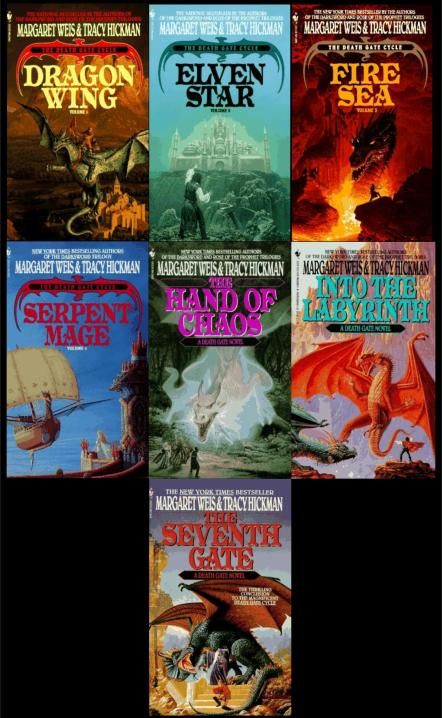Last Friday, I turned the last ebook page in the book The Seventh Gate by Margaret Weis and Tracy Hickman. In doing so, I also turned the last page in the Death Gate Cycle, a seven book series. The series was recommended by one of my favourite professors from university. During one of our breaks in her class, we were talking about good books and she said that the Death Gate Cycle is one of her favourite fantasy/sci-fi series. As an avid reader and a fan of fantasy/sci-fi, I knew that I'd have to give it a shot. Thus began my journey through Death's Gate.
From the get-go, I was struck by the creativity of the world--or should I say worlds in which I entered. I would say that the books are mainly centered on two races of people: the Sartan and the Patryn. Both are able to use the magic of possibilities meaning that in any given moment, they can examine existing possibilities and make them happen. Standing beside a river, there is the possibility that it could be frozen solid or dry as a bone, the possibility that there is a bridge or that he or she is already standing on the other side. Because of their power and strength, they are considered like gods to the races of mensch (dwarfs, elves, and humans).
The Sartan and Patryn are bitter enemies and were locked in a war with no end. Because of that, the Sartan decided to "sunder" the world into four separate worlds for them and the mensch while creating a separate world called the Labyrinth for the Patryns. The Labyrinth was meant to serve as a correctional facility and upon completing it the Patryn would arrive in the beautiful city of the Nexus. Meanwhile, the four worlds of Arianus, Pryan, Abarrach and Chelestra were each made with a different primary element and were meant to work together to provide different resources. This sharing, however, never occurred.
The Death Gate Cycle occurs centuries after the sundering and in the aftermath, things have started to go terribly wrong. For one, the Labyrinth, which was supposed to instruct and guide the Patryns, turns into a deadly killer, fueled by fear and hate. It sends peril after peril unto the Patryn, making survival the main goal. The first Patryn to ever make it through the final gate and into the Nexus is called Lord Xar. Since his attaining his freedom, he has returned when he could into the Labyrinth in order to rescue more of his people. Upon emerging, these Patryns swear their loyalty to their Lord. One of these loyal Patryns is Haplo. Haplo is like a son to Lord Xar and is privileged to his Lord's plan. Wanting revenge against their ancient enemy, Xar sends Haplo (and by default his dog) to each of the four worlds through Death's Gate to gain reconnaissance and to stir up chaos so that he can later come in and take over.
This mission does not go as straight forward as would be expected and Haplo encounters numerous surprises along the way. Some of these things succeed in altering the way he looks at everything he thought he knew for certain. Ultimately, leading to a battle for the lives of everyone--his people, the Sartan and the mensch.
Liked: I really liked how the series built up. I thought the over-arching plot developed at a good pace over the course of the novels and left me time to digest before rushing on. I also really liked the creativity of the four worlds and of how they interact and helped each other.
There were both amusing and serious characters as well as characters that made me want to pull my hair out, but I think that was a good thing. If I didn't get frustrated with them, then there wouldn't have been the bumps that made the story that much better.
I also really liked the broad theme of "fear" which touched each of the books. Fear can spur us on to survive in bad situations, but it can also lead toward terrible decisions which have detrimental shock-waves.
Disliked/Problems: I think this was more so a me-problem, but I didn't realize that Haplo was one of the main main character until the second book. When the other characters from the first book didn't appear in the second, I was a little surprised and was a bit disjointed a bit. I quickly got my stride, though, so that was good.
Second, some of the names for things were a little whimsical. There is a great machine on Arianus that collects water from a raging storm to provide it to the other land masses, and it is called : "The Kicksey-winsey." It, along with a few other things, seemed very juvenile in comparison to other themes in the plot.
One last comment, I found books four and five slower than the others. Book five was the worst for me and I struggled getting through the first half of the book. They weren't bad books, just a bit of a lull. The series finished very strongly in the last two, Into the Labyrinth and The Seventh Gate. Couldn't put them down at that point.
Overall: I really enjoyed the series and am really glad that I read them. I recommend them to anyone who is looking for a new innovative twist on the classic fantasy/sci-fi adventure. This series has a very different feel from Memory, Sorrow and Thorn or LoTR, but different can be refreshing. If you do decide to delve within, I hope you enjoy!
R




No comments:
Post a Comment